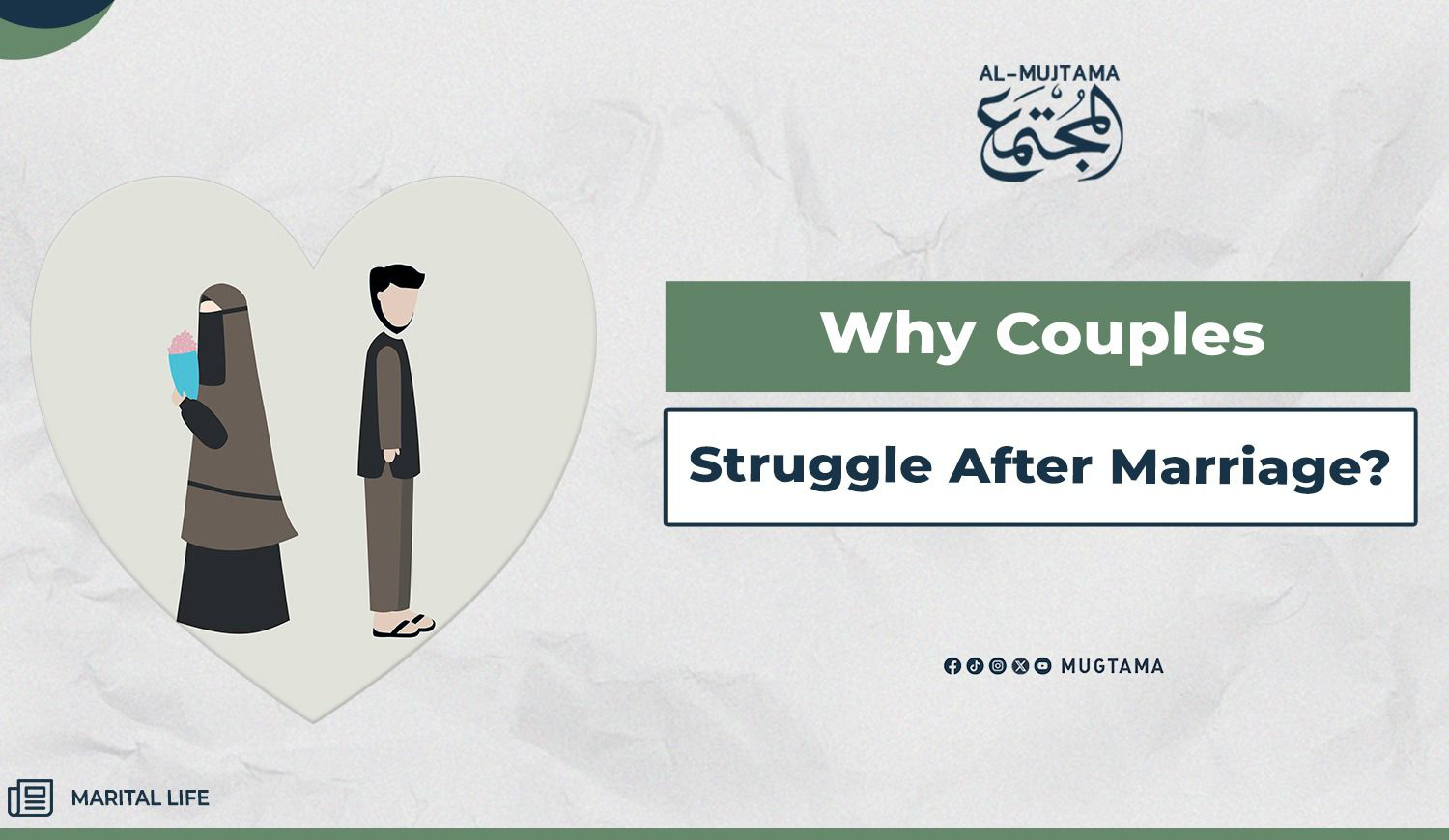Why Couples Struggle After Marriage?

Marriage remains the noblest of bonds and
the strongest of human covenants, legislated by Allah the Almighty. Yet reality
reveals a deep crisis that shakes this sacred tie: the shock after
marriage. Couples enter their shared life with romantic dreams and perfect
images painted by media and screens, but soon they collide with the harsh
reality—accumulating responsibilities, suffocating financial pressures, and
differences in temperament and expectations. Within months, many find
themselves facing a wide gulf between the life they dreamed of and the reality
they now live!
Why Do Dreams Collapse After Marriage?
1. The Huge Gap Between Expectations and Reality
Many couples step into marriage carrying
unrealistic expectations of perfection, often shaped by movies and TV dramas
that bear no resemblance to real life. Once marriage begins, their rosy dreams
crash against the rock of reality. No spouse can always live up to the other’s
idealized image, and real life itself allows no space for complete perfection.
This leads one or both partners to experience disappointment and shock.
Psychological studies indicate that couples
who enter marriage with unrealistic expectations experience lower satisfaction
with their partners during the early years. Moreover, 45% of divorced
individuals reported that unrealistic
expectations were a primary reason for their marriage collapse.
2. Ignorance of One Another
After the engagement period ends and
marriage begins, couples often realize they hardly know each other—each
partner’s temperament, habits, reactions under stress, and likes or dislikes.
Many ignored these aspects during engagement in the name of love and idealized hopes. After marriage, shock emerges, and incompatibility
is revealed, sometimes making it unbearable to continue life together.
A survey by Forbes found that about 59%
of couples who divorced within their first year cited incompatibility as the
direct reason for separation.
3. Ignorance of Marital Duties and Responsibilities
Sometimes couples enter marriage without a
clear understanding of their responsibilities toward one another, or
what marriage as an institution truly is. This ignorance may stem from their
upbringing, social backgrounds, or the absence of proper educational or
preparatory programs about marriage.
4. Financial and Living Pressures
Financial strains such as economic crises,
mounting debts, rising living costs, long working hours, and career challenges
heavily affect marriages. These pressures lead
to psychological exhaustion, lack of sleep, and mood swings, leaving couples
with less patience and tolerance. Research shows that financial and marital stress can have
devastating effects on the mental and physical health of spouses. In many
cases, unresolved financial issues manifest as frequent arguments over minor,
unrelated matters.
5. Imbalance in the Distribution of Roles
There are always socially expected roles
for husband and wife—who maintains the home, who works outside, who cares for
the children, who provides financially. When these roles are not clearly agreed
upon beforehand or when circumstances change (such as the wife working, the
husband’s job shifting, or relocation), imbalances arise. This often creates
resentment and tension. Studies measuring “role compatibility” between spouses
reveal that when couples have clear agreements about their roles, marital
satisfaction and acceptance increase significantly.
6. Blaming One Another
Many couples rush to blame their partner whenever a problem
arises, whether big or small. Instead of searching for mutual causes or
solutions, they engage in finger-pointing, which weakens communication and
drags the relationship into a sea of conflict and distress.
Psychological research indicates that
blaming the partner is associated with significant decreases in marital
satisfaction, increases in conflict, and a diminished sense of emotional
security. One study, “Blame, Control, and Marital Satisfaction: Wives’ Attributions for Conflict in Marriage,” found that wives who
blamed their husbands reported lower satisfaction in their marriages.
How Islam Addresses Post-Marriage
Shocks?
Islam makes it clear from the outset
that marriage is a solemn covenant based on affection and mercy, not
on unrealistic dreams. Engagement in Islam was legislated so that both partners
can examine each other’s character, habits, and expectations of family life,
ensuring compatibility before
marriage. The Prophet (peace be upon him)
said: “Look at her, for indeed that is more
likely to make things better between the two of you.” (Abu Dawud)
Islam also set a clear framework for
marital duties: financial responsibility rests on the husband, while mutual
kindness and fair treatment are the foundation of marital success. Allah Says,
{Treat them fairly.} [An-Nisa’ 4:19] At the
same time, Islam allows flexibility and balance between spouses according to
their circumstances, as exemplified by the Prophet (peace be
upon him), who used to assist his family and
said: “The best of you is he who is best to his
family, and I am the best among you to my family.” This balance is
what saves the family.
When conflicts arise, Islam teaches
self-restraint, positive thinking, and avoiding constant blame. Allah Says, {O believers! Avoid many suspicions, ˹for˺ indeed, some suspicions are sinful.} [Al-Hujurat
12:49] Thus, the solution is not endless disputes or
accusations, but calm dialogue, shared responsibility, and reliance on Allah
while taking practical steps toward resolution.
Malaysia has given great attention to
preparing couples for marriage. It requires couples to attend pre-marriage
training programs designed to educate them on marital responsibilities, rights,
and duties. In Selangor State, one academic study
evaluated these programs. It found that while they did not statistically lower
divorce rates, they significantly improved marital understanding, emotional
stability, and family harmony. This proactive initiative aligns closely with
the Islamic vision of preparing couples for the challenges of married life
rather than letting them face reality unprepared.
Islam thus provides a realistic,
practical vision that spares couples the painful shocks of post-marriage
disillusionment. It lays the foundation for patience, mercy, and mutual
affection. Allah Says, {And one of His signs is
that He created for you spouses from among yourselves so that you may find
comfort in them. And He has placed between you compassion and mercy.} [Ar-Rum 21:30]
Also Read:
- Marriage: A Divine Sign for Thinkers and Proof Against Deniers!
- Comparisons Destroy Marriages!
- 5 Key Islamic Principles for the First Year of Marriage
---------------------------------------------------
Resources:
- Mahasin Al-Islam Encyclopedia.
- Tafsir Modoee Encyclopedia.
- Alukah.net











